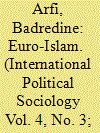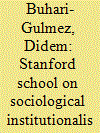|
|
|
Sort Order |
|
|
|
Items / Page
|
|
|
|
|
|
|
| Srl | Item |
| 1 |
ID:
099499


|
|
|
|
|
| Publication |
2010.
|
| Summary/Abstract |
This paper challenges the views in the fields of International Relations and International Law that treat the significance of law in the international system solely on the basis of the contemporary context marked by the increased institutionalization of world politics. Instead of focusing on the relationship between rules and the conduct of actors, we conceptualize the co-constitutive relationship between law and politics, and incorporate the multiple forms of legal-political expression that constitute power relations and dynamics into our analysis. Three dimensions of the co-constitutive relations between Law and Politics are explored: legal forms, legal constraints, and the indeterminacy of law.
|
|
|
|
|
|
|
|
|
|
|
|
|
|
|
|
| 2 |
ID:
099497


|
|
|
|
|
| Publication |
2010.
|
| Summary/Abstract |
Is a "Euro-Islam" possible? Whether at the level of theory, practice or policy, very few scholars and practitioners pay enough sustained attention to the fact that how we think/not-think, speak/silence, inscribe/erase, and address/ignore various aspects of "Islam in Western Europe" has much to do with the concepts of "identity" and "other." Whereas policy-makers, activists, peace-advocates, and fear-mongers continuously deploy these concepts for or against certain strategies, agendas and purposes, it is important to "deconstruct" these concepts so as to open up a horizon for thinking the possibility of a Euro-Islam. This paper thus argues that thinking of Euro-Islam implies an aporiatic politics of "Othering" and that it is possible to go beyond this aporia in a certain way by using a new approach for thinking about Islam in Europe. I develop this framework through a deconstruction of the concepts of "identity" and "other" using a non-Aristotelian logic of "without," the pair of undecidable concepts immunity/auto-immunity, and Derrida's notion of "negotiation."
|
|
|
|
|
|
|
|
|
|
|
|
|
|
|
|
| 3 |
ID:
099500


|
|
|
|
|
| Publication |
2010.
|
| Summary/Abstract |
In justifying participation in military intervention in Afghanistan and Iraq as part of the "war on terror," Australian Prime Minister John Howard invoked the memory of Australian sacrifice in war, linked most prominently to the so-called "Anzac myth." This paper explores the role of memory politics in enabling military intervention, discussing in the process the relationship between sites and forms of remembrance and broader discourses of national identity. This use of collective memory has significant implications for debates about Australian identity, and suggests the need for approaches to the study of international relations to take seriously the role of memory politics in coming to terms with conditions of possibility for particular security policies and practices.
|
|
|
|
|
|
|
|
|
|
|
|
|
|
|
|
| 4 |
ID:
099455


|
|
|
|
|
| Publication |
2010.
|
| Summary/Abstract |
Today the concept of globality is widely used to describe a condition characterized by the presence a single sociopolitical space on a planetary scale. Yet international relations theory has been either unwilling or unable to understand the global realm in sui generis terms. This paper argues that if we want to make coherent sense of the global realm and its relationship to the international system, we must account for how globality has been constructed as a social fact. The paper then tries to provide some of the foundations of such an account by analyzing how a distinctively global space was forged out of changing cosmological beliefs about the makeup of the terrestrial surface during the Renaissance, and how these new beliefs in turned conditioned the possibility of modern practices of territorial demarcation and national identity construction. If valid, this interpretation implies that the order of analytical priority between the international system of states and the global realm ought to be reversed, and hence also that a sui generis account of globality must be built on the recognition that the world was global well before it became international in any recognizably modern sense of this latter term.
|
|
|
|
|
|
|
|
|
|
|
|
|
|
|
|
| 5 |
ID:
099498


|
|
|
|
|
| Publication |
2010.
|
| Summary/Abstract |
Stanford School-World Society or World Polity approach-led by John W. Meyer has been largely overlooked despite its revolutionary insights (Robertson 2009). Nevertheless, renewed interest in neoinstitutionalisms and concepts as world society, culture, and legitimacy (Clark 2007) imply Stanford School's relevance for contemporary social and political sciences. This essay discusses first, the underlying theoretical arguments of the School, second, its main findings and responses to criticisms, and third, Stanford School's resonance with the Constructivist, Neoinstitutionalist, and Sociological turns in International Relations. Finally, it suggests that Stanford School opens new horizons for EU studies by establishing the "missing link" between globalization and European integration.
|
|
|
|
|
|
|
|
|
|
|
|
|
|
|
|
|
|
|
|
|